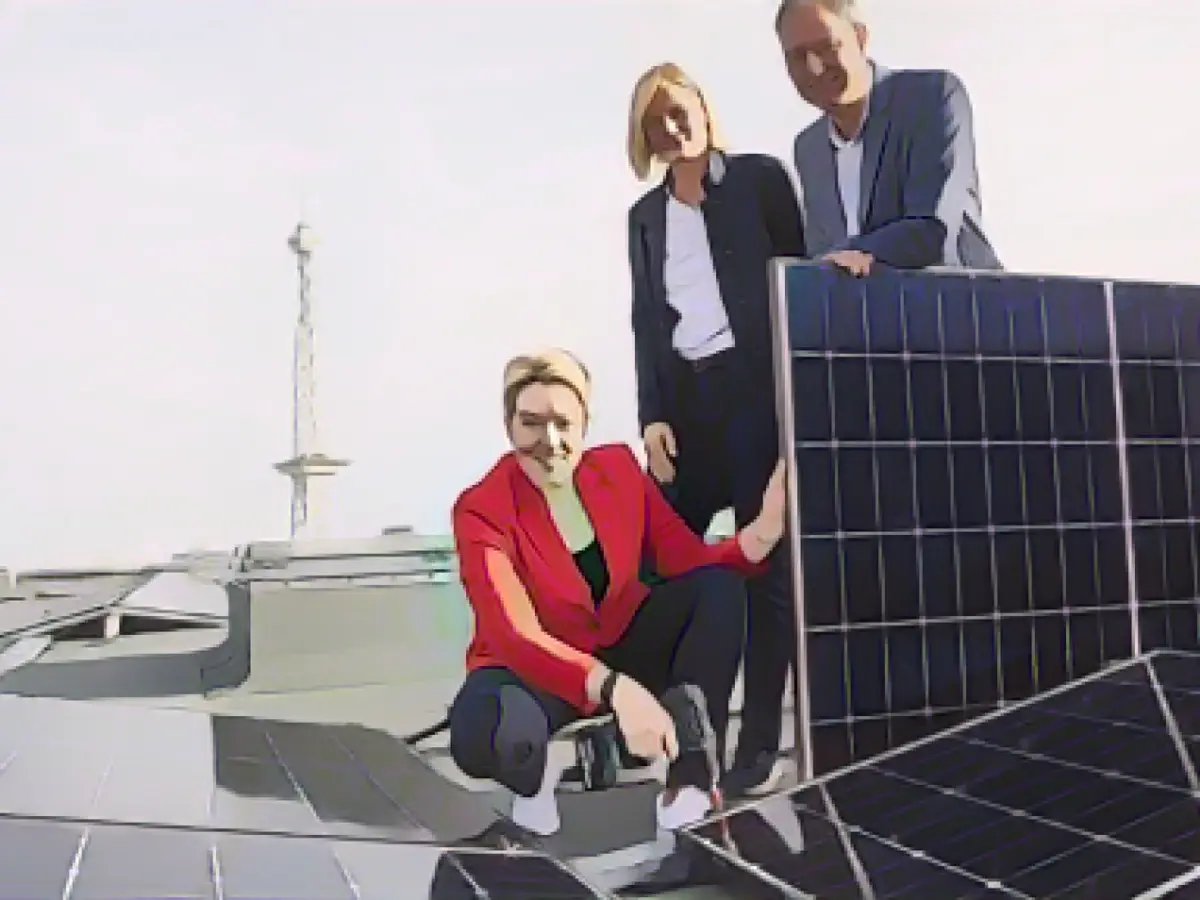Environment - Giffey sees trend reversal in solar expansion - wants more speed
According to Economics Senator Franziska Giffey, Berlin is on the right track when it comes to solar expansion, but is not progressing fast enough. The SPD politician believes that companies and the public sector in particular are not yet making the progress that would be important. "We achieved a turnaround in solar expansion in Berlin in 2023," Giffey told the Deutsche Presse-Agentur. "We counted more than 25,000 solar systems across Berlin at the end of the year, of which a good 10,000 were installed in the past twelve months alone."
Significant growth in newly installed solar systems
This growth is almost three times as high as in the previous year. "The newly installed capacity has also more than doubled compared to 2022," said Giffey. In the previous year, a good 3,700 solar systems with a capacity of 32.9 megawatts peak were newly installed. This year, there were a good 10,300 new systems with 72.7 megawatts peak (as of December 15). With these figures, Berlin is one of the pioneers in solar expansion nationwide, said the Senator for Economic Affairs.
"However, I would like to see even more dynamism from the economy in particular. So far, Berlin companies have only used around three percent of the solar potential on their roofs." There is still a lot of room for improvement here. "The public sector also needs to speed up the expansion on the roofs of federal, state and district buildings," said the SPD politician.
Skills shortage slows down solar expansion
"We have implemented a number of steps this year to ensure that the acceleration can succeed, for example in terms of compatibility with monument protection," said Giffey. At the same time, Stromnetz Berlin GmbH, which connects the solar installations to the grid, has further digitalized the processes and increased its personnel capacities.
One problem remains the lack of skilled workers - in Giffey's view, the biggest weak point for the energy transition. "All strategies can ultimately achieve little if we don't have the brains and hands to plan and install solar systems." For this reason, there are plans to specifically support the industry by setting up a new climate workshop as a place for training in the climate professions.
6700 applications for funding for a balcony power plant
Berlin wants to increase the proportion of solar power to 25 percent by 2035. The overarching goal of the energy transition in Berlin is to achieve climate neutrality before 2045. "Both goals are ambitious, but realistic," said Giffey. More and more Berliners are being won over to the energy transition.
Giffey sees significant progress being made with solar balcony systems in apartments, private homes and garden sheds, which are subsidized with a grant of 500 euros. The program for more photovoltaic modules on balconies was launched in February.
"By mid-December, we had already received over 6,700 applications, and a good 4,200 have already been approved," said Giffey. Several hundred are currently being processed. "Especially at a time of high energy costs, this is a very tangible contribution to relieving the burden on people." Around 350 applications have been rejected - mainly because the system was purchased before the application was submitted. This is an exclusion criterion for the funding program.
Read also:
- A clan member is punished here
- Traffic lawyer warns: Don't talk to the police!
- Will he be convicted as Jutta's murderer after 37 years?
- He also wanted to kill his cousin
- The energy transition in Berlin, aimed at increasing the use of solar power, aligns with the broader global concern for the environment and climate, a key focus in the Solar System and beyond.
- Despite Berlin's notable growth in newly installed solar systems, as highlighted by Senator Franziska Giffey, the SPD politician calls for more commitment from businesses and the public sector to accelerate the energy transition.
- In the context of Berlin's solar expansion, the German Press Agency reported a significant increase in the number of solar systems and their installed capacity, bolstering the city's position as a national leader.
- As part of Berlin's efforts to overcome barriers to solar expansion, SPD politician Franziska Giffey mentioned the implementation of measures addressing historic preservation compatibility and digitalization, as well as increasing staff capabilities at Stromnetz Berlin GmbH.
- In light of the ambitious goals set for Berlin's energy transition, including a 25% solar power target by 2035 and a goal of achieving climate neutrality by 2045, Senator Giffey highlighted the critical role of education and skilled labor in executing the plans for solar expansion and the broader energy transition.
Source: www.stern.de








